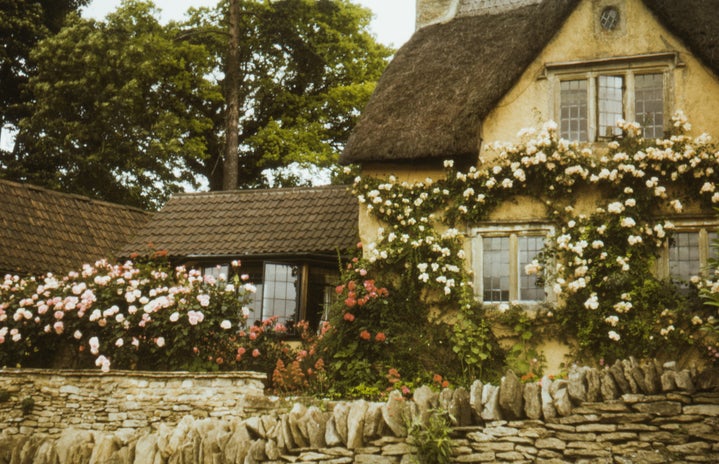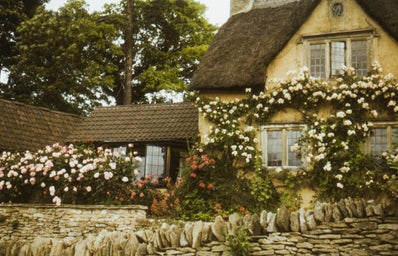Wouldn’t it be nice to run away and live on a farm, completely free of society? You could grow your own food and take care of animals, becoming one with nature. Imagine sewing your own frilly skirts and foraging mushrooms! Life would be so simple and harmonious.
Yes, this is the “cottagecore” aesthetic, popularized by TikTok, after its initial growth on Tumblr. Think of “Little Women” or “Pride and Prejudice.” While the “cottagecore” aesthetic seems dainty on the surface, here are a few things to ponder while you frolic in a meadow.
This aesthetic glamorizes old-fashioned western agricultural life, which was only a good time for straight white men in the United States. Women and minorities were decades away from having equal protection under the law. Millions were exploited through slavery. That’s the only problem with upholding “cottagecore,” right?
Not quite.
- You Can’t “Reclaim” Land That Was Never Yours
-
“Cottagecore” enthusiasts dream of “connecting with the land,” but this fantasy is reminiscent of colonialism. European settlers came to the United States without recognizing that land wasn’t just “up for grabs.” They pushed indigenous populations away from their homes, and they brought diseases that killed 90% of the indigenous people.
According to the US Department of State, under the Indian Removal Act of 1830, “[Andrew] Jackson and his followers were free to persuade, bribe, and threaten tribes into signing removal treaties and leaving the Southeast.” Many people died as they waited in camps to be deported.
The genocide of indigenous people in the United States is largely ignored by “cottagecore” lovers, who unknowingly rationalize the colonialist mindset that land is available for the taking. You can’t “reclaim” land that never belonged to you in the first place, but what else is wrong with wanting to escape to a simple rural farm life?
- People Romanticize Escaping to a Farm Life
-
The tendency to become mentally distracted in a fantasy world is known as escapism. “Cottagecore” enthusiasts often fantasize about running away to raise farm animals and cultivate crops. While some may start a little herb garden, most will never understand how difficult and dangerous agricultural labor can be. Romanticizing this kind of work ignores reality.
A large percentage of agricultural workers in the US are non-white immigrants who do tough work for low wages. As of 2018, 57% of agricultural employees were people of color, and 43% were not born in the US. The complex, gigantic world of United States agriculture is largely ignored by those who don’t work for the system. A “cottagecore” enthusiast may romanticize picking cherry tomatoes from their backyard garden but won’t think twice about where their apples, soybeans and corn come from. An actual job in agriculture isn’t something that many would want to “escape” to.
Okay, but what about people who just post pretty pictures of cottages and flowers on the Internet?
- Social Media Algorithms Favor White Creators
-
“Cottagecore” content creators post pictures and videos that uphold their aesthetic. Social media algorithms make recommendations based on what a user has liked and followed in the past. In the case of TikTok, researcher Mark Faddoul found that the TikTok algorithm would recommend videos of people who looked similar to people the user already liked.
BIPOC creators who post “cottagecore” content are less likely to benefit from an algorithm than equivalent white creators. The aesthetic is dominated by white people, so white people continue to be recommended, while smaller racial groups continue to be pushed down.
- Actively Following Creators of Color is Essential
-
Influence your own algorithm to see a diverse array of whatever content you’re seeking. Choosing to follow more BIPOC creators will tell the algorithm to show you even more. If you’re looking for “cottagecore” creators:
@BlackForager educates her audience about how to find and use wild ingredients like mushrooms and berries.
@Iridessence is an amazing burlesque performer who models for flowery photos.
@HillHouseVintage’s style inspiration makes me want to redecorate my entire house (and life).
“Cottagecore” creators of color are helping to reclaim this aesthetic, rather than allowing it to remain an idyllic, white view of the rural past. There’s nothing wrong with appreciating nature, baking bread and incorporating this aesthetic into your life. Please just don’t ignore the racist roots of “cottagecore.” Learn a little bit before you sing with the songbirds and plant that garden.



